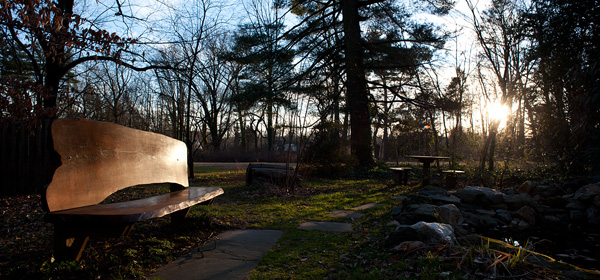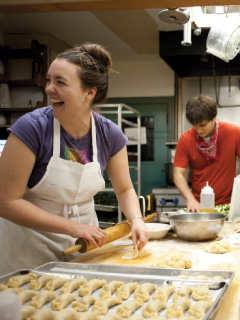 story by Dana Henry photo by Albert YeeThe campus of Pendle Hill, a Quaker retreat center near Swarthmore, Pa., has a storybook-like serenity. Colonial-style stone walls are tucked into the lush green grounds and bordered with dense, wild foliage that blocks the roadway, leaving only the soft voices of Friends (Quakers) and the chatter of birds.
story by Dana Henry photo by Albert YeeThe campus of Pendle Hill, a Quaker retreat center near Swarthmore, Pa., has a storybook-like serenity. Colonial-style stone walls are tucked into the lush green grounds and bordered with dense, wild foliage that blocks the roadway, leaving only the soft voices of Friends (Quakers) and the chatter of birds.
The retreat center, purchased as an estate and arboretum, was founded in 1930, and it doesn’t appear much has changed since then. Houses are painted an unadorned white. Deer and fox pass through the property. Trees are stories taller than any building. The calm exterior, however, belies the impassioned discourse, activism and action happening there. At Pendle Hill, it’s not uncommon to hear people talking about urban food production or expressing concerns over hydraulic fracking. In fact, the principles and work of the center demonstrate that traditional religious beliefs have led many to precisely the same ideas embraced by the modern sustainability movement: a focus on community, a pull toward activism, attention to agriculture and food, and an aesthetic of simplicity and reuse in design.
Core Values
For many Quakers, these beliefs are rooted in a concern with being in “right relationships,” or living in a way that preserves the integrity of Earth’s gifts for all living beings. They predict that if current lifestyles are maintained, future wars will be fought over diminishing natural resources—oil, water, metals, even food. They hope that renewable energy and moving beyond growth economics will help the world be at peace. Jennifer Karsten, the center’s interim executive director, explains that “current carbon-based energy use is on a collision course with [current] lifestyle and the resources available to sustain it, and the harmful effects are irreversible. That’s why you’ll see pockets of Friends who are deeply participating in issues of sustainability.”
Activism has always been at the heart of Quaker spiritual life. The faith is decentralized and doesn’t emphasize afterlife. Spiritually grounded work occurs through individuals who are true to their “calling” and guided by Quaker testimonies (values): simplicity, peace, integrity, community, equality and stewardship of resources. Spiritual fulfillment occurs through worship and authentic living in this world, not the next.
Quakers have helped to establish more than a hundred humanitarian organizations, including Oxfam, Greenpeace and Amnesty International. The movements that define our nation’s development—religious tolerance, women’s equality and suffrage, the abolishment of slavery, the civil rights movement, anti-war “pacifism”—have roots in non-violent Quaker leadership. More recently, Occupy Philly participants received extended support from neighboring meeting houses (places of Quaker worship), including donations of food, use of a kitchen, bathrooms and showers. Considering their scant numbers—globally, there’s probably less than a few hundred thousand—the faith continues to have an outsized impact.
Pendle Hill contributes to activism as a place where individuals find spiritual renewal in a natural setting. The center accommodates conferences, bed and breakfast stays, workshop retreats and student residency programs that last 10 weeks to a year. There are silent spaces for reflection, classes and workshops on nonviolent communication, spirituality and the arts, and moments of structured and informal discussion.
These opportunities for spiritual grounding have attracted famous activists including Eleanor Roosevelt, Jean-Paul Sartre and associates of Martin Luther King Jr. Eulle Gibbons researched and wrote the first draft of Stalking the Wild Asparagus while employed as Pendle Hill’s head of maintenance. One intention of the Pendle Hill community is that those who visit will take a piece of what they learned back into the world with them. This phenomenon, according to Karsten, is part of how change happens. In an era when social justice is increasingly associated with environmental responsibility, Pendle Hill has a renewed role as steward of the Earth.
A Model for Low-Impact Communal Living
The retreat center also aspires to be a living “laboratory” where guests can learn about agriculture, energy and community. The lessons are motivated by a need to solve both short- and long-term sustainability issues
Joel Fath, Pendle Hill’s garden coordinator and cook, a lean young man with shaggy brown hair and an earnest demeanor, explains his devotion to gardening: “The reason I garden is to be near plants and to work with their energies and spirits. The art of creating ‘whole’ foods at its root can show people what food does to our bodies. That’s something we’ve forgotten.”
Fath teaches courses on permaculture and is a practitioner of the no-till farming methods introduced by Masanobu Fukuoka, the Japanese farmer, and Emilia Hazlip, the Catalonian gardener. The Pendle Hill garden, which Fath works on with fellow staff and resident students, focuses on year-round food production. Leafy greens, tomatoes and green beans are planted in trenches piled high with brush and composted organic food scraps—no pesticides or synthetic fertilizers. The garden also has a hoophouse and aquaponics system, and plans to add a pellet stove (For more on the aquaponics system check out Grid’s September 2011 issue).
In the ’50s, the Quaker ideal of “living off the land” led members of Pendle Hill to plant fields of corn and tomatoes and to supplement their breakfast with house-canned tomato juice. Today, Fath incorporates native greens of the “foraged” variety in the garden. This includes chives, alliums, violet flowers and linden trees. He’s also working on a seed-saving program and a line of Pendle Hill seeds.
Fath points to the political nature of traditional agricultural practices such as seed-saving, the age-old practice of retaining seeds for future growing. “We have international companies that take seed integrity and alter it in such a way that prevents farmers from using seed from year to year. It sets up an economic system that’s broken.” By saving seeds, Pendle Hill is supporting a natural local economy. “[I]t saves us money and connects us more with the land,” he says. Currently, Lloyd Guindon, grounds manager of 25 years, is investigating a tree that may be a rare American Chestnut (most were wiped out by blight) with hopes of further propagating native tree species.
 photo by Albert Yee
photo by Albert Yee
The garden supplements the larger menu, which Albert Sabatini, Pendle Hill’s chef, creates from ingredients grown within a 55-mile radius. This includes beef, poultry, dairy and soy products (Quakers believe in eating “low” on the food chain; only three meals a week include meat). A lunch in October included a spread of colorful delights, including borsch, sweet potatoes, fried tempeh with homemade kraut, and a tomato and goat cheese salad with wild greens. Staff and guests eat together at large tables, and guests are always welcome. After meals, food scraps are added to the compost pile and everyone on staff—even the executive director—takes turns washing dishes.
“What struck me most about my experience at Pendle Hill is that it models a possible paradigm shift toward low-impact communal living,” says George Owen, a Quaker and retired architect who has lived at Pendle Hill for the last several years as the spouse of a resident staff person. During that time, he has taken workshops, taught courses and served as Pendle Hill’s volunteer sustainability coordinator. Owen credits Pendle Hill’s small ecological footprint to the efficiencies of sharing resources and labor. “But here is the key: the challenges and difficulties of communal living are overcome by the shared spiritual covenant of journeying together.” And furthermore, Owen explains, this communal living “is held and grounded by the beauty and stewardship of the land, trees and garden—a long-standing engagement with the earth.”
In Harmony With Nature, and Welcoming to All
Deeply rooted in the Quaker ideology is the notion that material goods can distract from spiritual work. John Woolman, an 18th century Quaker businessman wrote: “So great is the hurry in the spirit of this world, that in aiming to do business quickly and to gain wealth the creation at this day doth loudly groan.” He encouraged Friends to strive to live in balance with nature and one another.
Pendle Hill continues to carry forth the early Quakers’ ambition. They added geothermal pumps more than 20 years ago. Interior furnishings are adopted from fellow friends and repaired in an onsite woodshop rather than replaced. Fallen trees are cut into slabs of wood and crafted into benches.
In October, Pendle Hill hired Re:Vision Architecture to develop the architectural core that will take their stewardship to the next level. The design process will take six months, and will include energy-saving renovations to three major buildings, land management strategies and improved use of outdoor space. Whether Pendle Hill adds a compostable toilet, green roofs or a windmill, they’re investing in a campus that’s “teachable” to their guests.
Karsten first learned of the firm while Re:Vision was coordinating the LEED process at the Friends Center at 15th and Cherry Streets, where she and her husband are members. Re:Vision had salvaged nails from a previous demo and used them in the new construction. It was an example of lived testimony that Karsten says, “won our hearts.”
But an exemplary model of sustainable living is only valuable if it’s also inclusive.
Pendle Hill continues to work toward “beloved community,” respecting divine spirit in everyone regardless of age, sexuality, race, nationality, gender or class, explains Karsten. The staff practices “radical” (meaning “at the root of”) hospitality that includes “providing an atmosphere of inclusivity and striving to increase our cultural competence,” says Karsten. The hope is to model being in solidarity—an essential aspect of sustainability work.
“Sustainability can be defined as making life possible for future generations,” says Karsten. “This can be a personal and cultural focus. To the degree that we’re in solidarity with the underprivileged or can identify with the divinity in everyone, only then will we be able to unite and create a world that is fair or works for everyone.”







